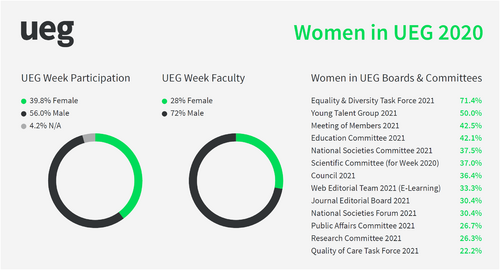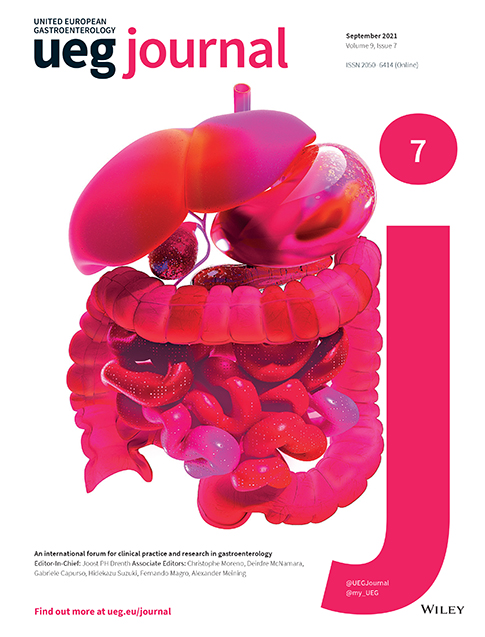How to identify, encourage, and support suitable candidates for leading roles in scientific societies: The UEG experience
Radislav Nakov and Mohamed Alboraie are equally contributing first authors.
INTRODUCTION
The ability to identify, encourage and support suitable candidates for leading roles in boards and committees of scientific societies like United European Gastroenterology (UEG) is a vital issue. The composition and quality of volunteers working for scientific societies are essential for the quality of their education, research and scientific programmes, and the reputation and competitive position of the society in the academic community.1
How suitable candidates are identified, how talent is recruited, and what consequences this has for fairness, transparency, equality and diversity are vital questions. Even in the scientific world, where bibliometrics and previous experiences are used to evaluate candidates, the recruitment and selection of academic talent is not simply a technical endeavour that involves judging which candidates are the best. It is also a political endeavour that involves negotiations between multiple players.
Recently, there is widespread interest in women's underrepresentation in science and medicine; however, progress towards gender equality in these fields is slow. While the number of women receiving postgraduate degrees has increased in recent years, the number of women in faculty positions remains unchanged.2 In many European countries, Gastroenterology is still a predominantly male medical speciality. Although the proportion of female gastroenterologists' representation in leadership roles increases, it remains lower than across all other medical specialities, which is reflected in attendance and scholarly contributions.3, 4
A not to be underestimated aspect in the sluggish progress towards gender parity are damaging and pervasive gender stereotypes, which may facilitate hiring discrimination and reduce opportunities for women's career advancement.5 In fact, the following three factors are known to contribute to gender inequalities: numeric underrepresentation and stereotypes, lack of supportive social networks and chilly academic climates.2
However, it seems volunteer-led organisations are becoming less strongly influenced by these factors, as female representation in boards and committees of scientific societies has been growing in the past few years. In UEG, this is the result of a conscious strategic decision taken by the volunteer leadership a few years ago. The UEG Strategic Plan defines integrity, diversity and transparency, in addition to quality, independence, respect and accountability, as the core values of UEG as a professional non-profit organisation. One of UEG's overall objectives is striving for equality of opportunity and inclusion, in particular regarding to age, gender and nationality. These objectives are implemented to UEG projects by the working committees and administration, and driven by the continuous efforts of a dedicated Equality and Diversity Task (EDT) Force. We would like to share the UEG experience in identifying, encouraging and supporting suitable candidates from diverse backgrounds for leadership positions.
THE UEG EQUALITY AND DIVERSITY TASK FORCE
The UEG EDT Force was established in 2015. It aims to provide equal opportunities and foster the involvement of underrepresented groups in all UEG activities irrespective of gender, age, background, ethnicity, ability and experience. EDT creates an environment of inclusiveness and addresses areas where inequalities throughout European gastroenterology prevail.6 EDT consists of seven volunteer specialists in digestive health, diverse in age, gender, region and expertise and is cross-represented in other UEG Boards and Committees, such as the Scientific Committee and the Young Talent Group.
Over the years, EDT has established a community network for women in gastroenterology (GI), in real life as well as on social media (#UEGWomeninGI). The trust and visibility that EDT has gained by tending to this network helps them fulfil one of their most important tasks, which is to identify candidates from diverse backgrounds, including women, for open posts in UEG Boards and Committees, to encourage them, offer support and network for their success in elections. The numbers clearly show that EDT has been successful in this task: In 2015, there were no female representatives in UEG Council, whereas in 2020 there were five, an increase of 36.4%. The percentage of women in UEG Boards and Committees in 2020 can be seen in Figure 1. The numbers are encouraging; however, more females and more candidates from underrepresented countries should apply for open positions in UEG, to reach an even better balance and, importantly, contribute to the organisation's mission and success with their diverse knowledge, skills and perspectives. EDT plays a vital role in achieving this goal.

Statistics 2020 regarding women's representation in United European Gastroenterology (UEG) Week participants and faculty, and in UEG Boards and Committees
HOW DOES EDT IDENTIFY, ENCOURAGE, AND SUPPORT SUITABLE CANDIDATES FROM DIVERSE BACKGROUNDS FOR LEADING ROLES IN UEG?
To maintain organisational vitality, UEG determines 4-year terms of office for volunteer posts and thus, periodically releases calls for open positions in its boards and committees. Early on, the EDT identifies suitable candidates from among volunteers in UEG-related activities, based on formal (involvement in UEG and professional qualifications) and informal criteria (social and soft skills). The EDT Chair collects suggestions from the members and during a meeting, the best three candidates for each position are selected, in order of best suitability for the role and acceptance by the members. Then, the EDT Chair contacts the first candidate by email, informs them about the open position, encourages them to apply, highlights that they possess the capabilities for the role and underlines the difference they can make for the digestive health community by contributing to the work of UEG Boards and Committees. Moreover, the EDT Chair points out which kind of support the candidate can get from EDT, that is, a formal supporting letter, consultations, assessment of application documents and staying in touch before, during and after elections.
As a result of EDT efforts, in 2022, for the first time in UEG history, the organisation will have a female President, Prof. Helena Cortez-Pinto (Portugal). Moreover, talented female colleagues will assume the roles of Secretary General (Prof. Jeanin van Hooft, The Netherlands), Chair Scientific Committee (Prof. Julia Mayerle, Germany) and Chair Public Affairs Committee (Prof. Patrizia Burra, Italy), fulfilling UEG's commitment to work with brilliant and forward-thinking female leaders. The success story of Jeanin van Hooft, current UEG Secretary General Elect, is described in the following few lines, and is based on her talk at the National Societies Forum Meeting (virtual) in March 2021.
In 2021, after receiving encouragement from the EDT as well as from other colleagues to apply for the position of UEG Secretary General, Jeanin followed an organised strategy in preparation for her candidacy and the elections. Jeanin made up her decision to apply for Secretary General based on the role description, the term of office (as she considered that she had just started as Head of Department at Leiden University), and the details she was provided by the EDT, the UEG headquarters, and other UEG officers, regarding the knowledge requirements and responsibilities of the role. Jeanin contemplated how she fit the role and how the role fit her, what her impact could be and how she could add to the mission of UEG. On reaching a good ‘gut feeling’ and the final decision to apply for UEG Secretary General, she sought the support of her family, her colleagues working in her department, the members of professional societies, and leaders in the field. When she saw that she received a great amount of support, Jeanin proceeded to exploring in depth what the organisation UEG is about, who their members and the related communities are, the organisational structure, strategic plan and activities.
The application process started with submitting a mission statement, her CV, and letters of support from UEG member societies and the UEG EDT. Then, Jeanin began a networking campaign to inform colleagues eligible to vote on the position about her preparedness for the role. She reached out to individuals, UEG committees and member societies to inform them about her candidacy and emphasise her mission statement. In October 2021, Jeanin presented her vision and strategy for UEG to the Meeting of Members and was successful in getting the majority of the votes in the subsequent elections, by which she received the honour to become the first woman to assume the role of UEG Secretary General Elect.
CONCLUSION
Equality and diversity in GI can only be achieved by fighting stereotypes and creating supportive networks for underrepresented groups. Specific taskforces promoting and supporting equal opportunities for all members are needed in every scientific society. The UEG EDT through its successful actions gives an ideal example of how to identify, encourage and support suitable candidates from diverse backgrounds for leadership positions in scientific societies.
ACKNOWLEDGEMENTS
The editorial assistance of Ms Andrea Nowak, UEG Equality & Diversity Task Force Project Manager, is gratefully acknowledged. We thank Prof. Jeanin van Hooft, Head Department of Gastroenterology and Hepatology, Leiden University Medical Centre, Leiden, The Netherlands, and UEG Secretary General Elect for allowing us to share her success story and for critical review of the manuscript.
Open positions on UEG Boards and Committees are published regularly on the UEG website: https://ueg.eu/opportunities/career-development/open-positions; https://ueg.eu/opportunities/career-development/open-positions#tp.
Open Research
DATA AVAILABILITY STATEMENT
Not applicable.




